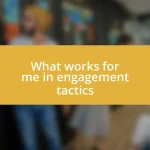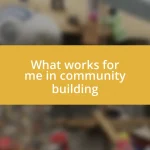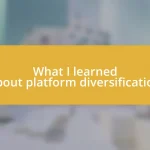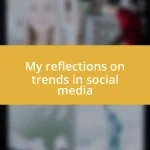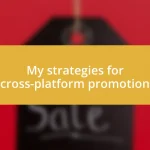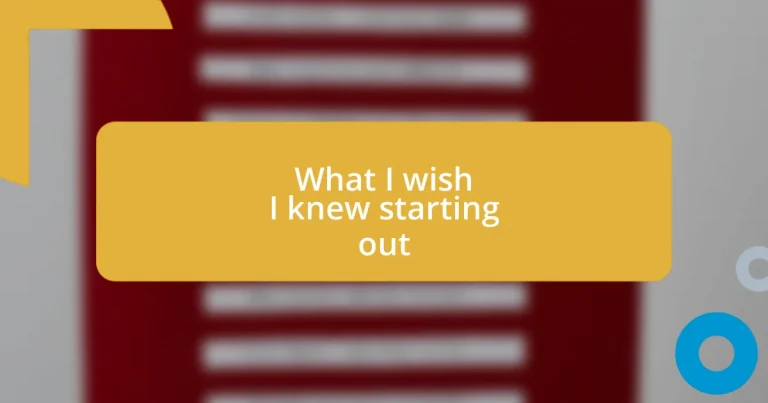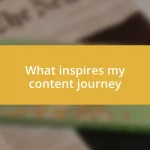Key takeaways:
- Patience and resilience are crucial; setbacks should be viewed as learning opportunities.
- Seeking feedback and building a supportive network significantly enhances growth and collaboration.
- Practical skill development, such as effective communication and adaptability, is vital for professional success.
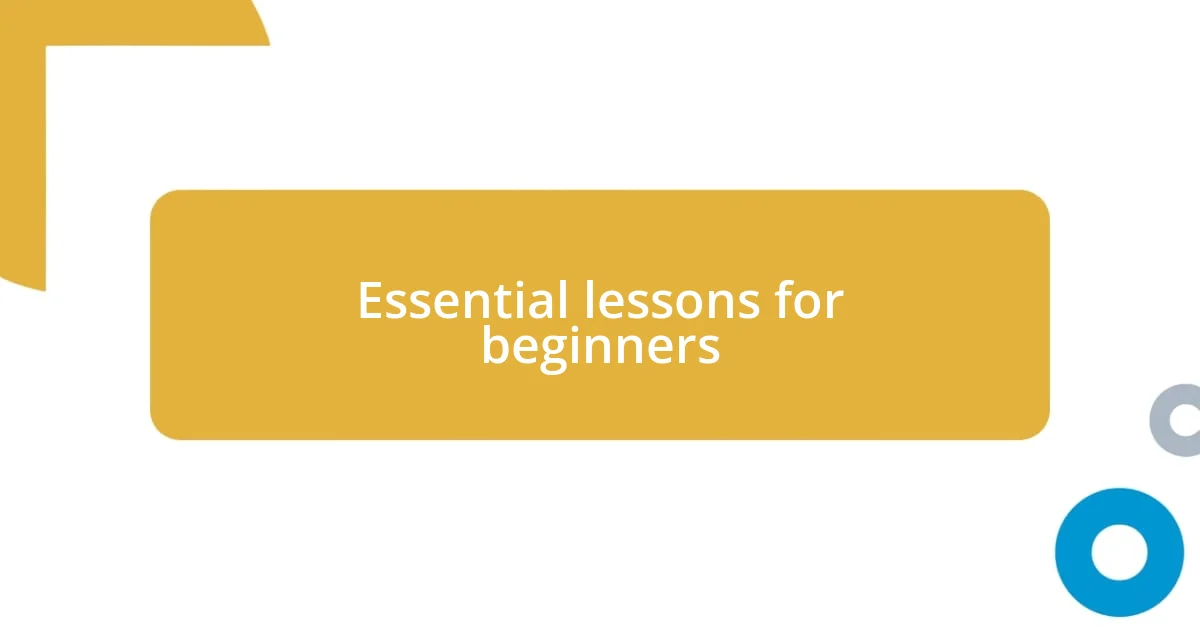
Essential lessons for beginners
One essential lesson I learned early on is the importance of patience. In my early days, I often felt frustrated when things didn’t come together as quickly as I’d hoped. I wondered, “Am I doing something wrong?” But I’ve come to realize that growth takes time, and each setback is just a stepping stone toward success.
Another key takeaway is to embrace failure as part of the journey. I vividly remember a project I poured my heart into, only to have it fall flat. At that moment, I felt disheartened. Yet, looking back, I can see how that experience shaped my resilience and pushed me to refine my skills. Have you ever had a similar experience where failure turned into a valuable lesson?
Lastly, seek feedback and be open to it. When I first started, I was hesitant to ask for input, fearing criticism. However, I soon discovered that constructive feedback was invaluable. It helped me see blind spots and improve tremendously. Isn’t it fascinating how a simple conversation can accelerate your learning?
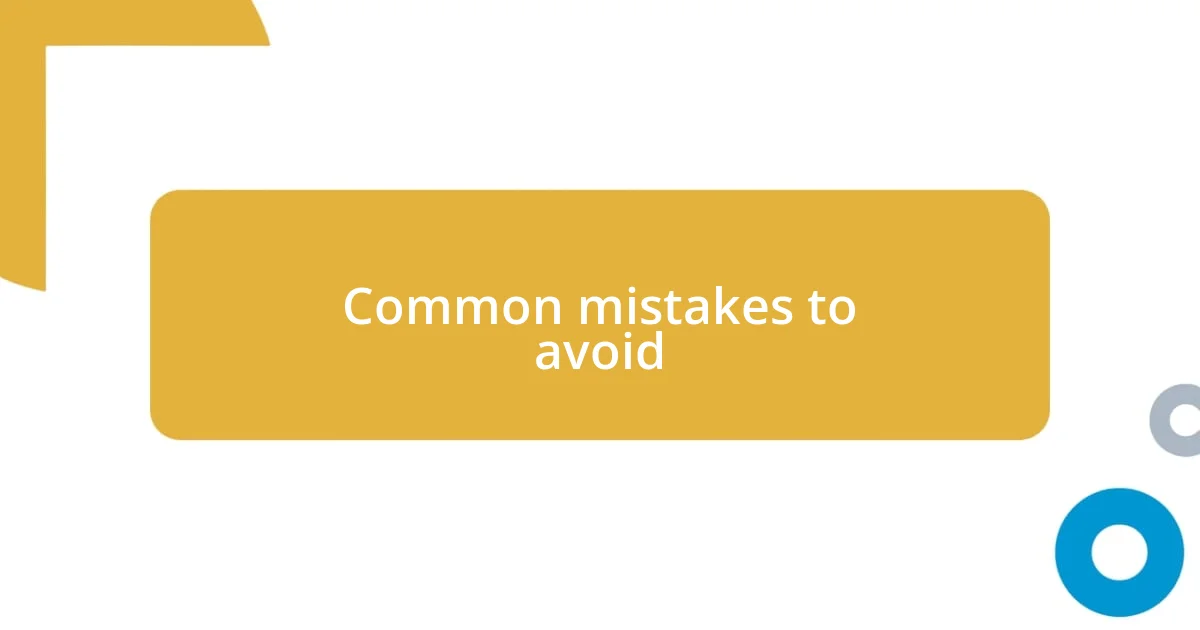
Common mistakes to avoid
When I think back on my early days, one common mistake I made was trying to do everything myself. I was so eager to prove myself that I shied away from asking for help. Looking back, I realize how isolating that approach was. Collaborating with others not only lightens the load but also opens doors to new perspectives and ideas. If I could turn back time, I’d reach out sooner and build a supportive network.
Here are some common mistakes to be cautious of:
- Overcommitting: Trying to juggle too many tasks can lead to burnout.
- Neglecting self-care: It’s easy to forget to take care of oneself amid the hustle.
- Ignoring your instincts: Trusting your gut can often guide you better than overanalyzing every choice.
- Failing to set boundaries: It’s crucial to protect your time and energy, even from well-meaning people.
- Avoiding risk: Playing it too safe can restrict growth; sometimes, you must take that leap of faith.
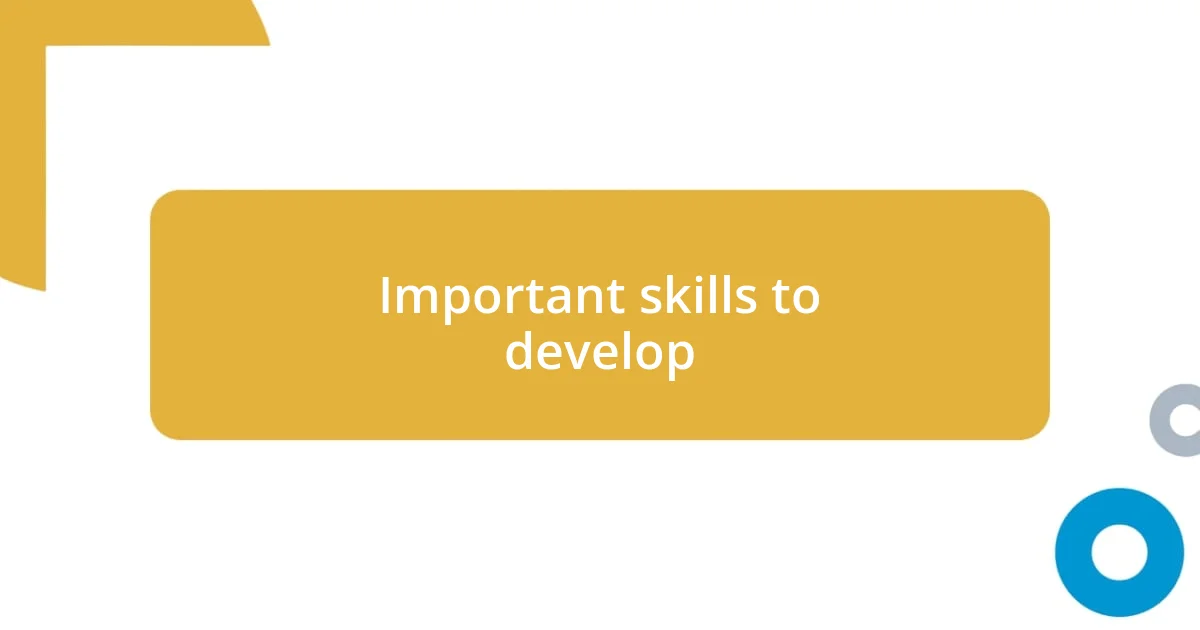
Important skills to develop
Developing skills early on can shape your journey dramatically. One vital skill I wish I had focused on more is effective communication. I remember times where miscommunication led to lost opportunities, and I thought, “If only I had articulated my ideas better.” Practicing active listening and clear expression has not only improved my relationships but also enhanced team collaboration immensely.
Another crucial skill is adaptability. In my experience, the landscape of any field can shift unexpectedly. I once committed to a project that quickly became irrelevant due to changing market trends. Adapting to the situation allowed me to pivot and embrace new opportunities, showing me the value of being flexible and open-minded.
Networking is an often-overlooked skill that I underestimated when I started. Building relationships can be just as important as honing technical abilities. I vividly recall attending a local meetup, hesitant to introduce myself. However, those connections turned into invaluable mentorships and partnerships. Investing time in networking pays dividends in knowledge and career growth.
| Skill | Description |
|---|---|
| Effective Communication | Articulating ideas clearly and actively listening to others. |
| Adaptability | The ability to adjust to new situations and embrace change. |
| Networking | Building and nurturing professional relationships for growth. |
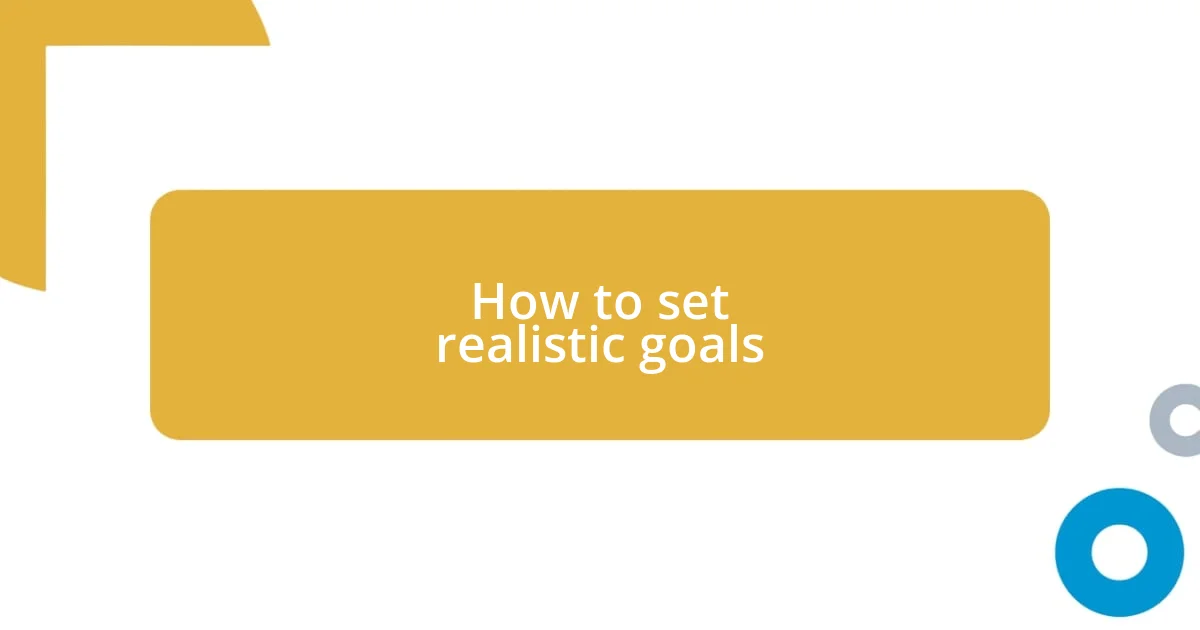
How to set realistic goals
When I reflect on my early experiences, I remember setting lofty goals without a clear plan. I often found myself overwhelmed and frustrated when those ambitious dreams didn’t materialize. Instead of starting with that big picture, I learned that breaking my goals down into smaller, manageable steps made all the difference. What if you tried outlining a few key milestones instead? It’s about focusing on progress rather than perfection.
One technique that worked wonders for me was the SMART criteria—specific, measurable, achievable, relevant, and time-bound. I once set a goal to learn a new programming language, but I made it practical by deciding to complete one module per week. This way, I could track my progress, stay motivated, and ensure it fit within my schedule. Have you ever found it easier to stay committed when the goal feels attainable? Establishing clear benchmarks can empower you to push forward.
Moreover, I can’t emphasize enough the importance of flexibility in goal-setting. Life can throw unexpected challenges our way, and it’s essential to adapt our goals accordingly. I remember a time when I was eagerly pursuing a certification, but then personal issues arose that required my attention. Instead of abandoning my goal entirely, I adjusted my timeline, allowing myself the grace to prioritize what mattered most at that moment. How can embracing adaptability in your goals lead to greater success in your journey? From my experience, it creates space for growth, learning, and ultimately achieving what truly resonates with you.
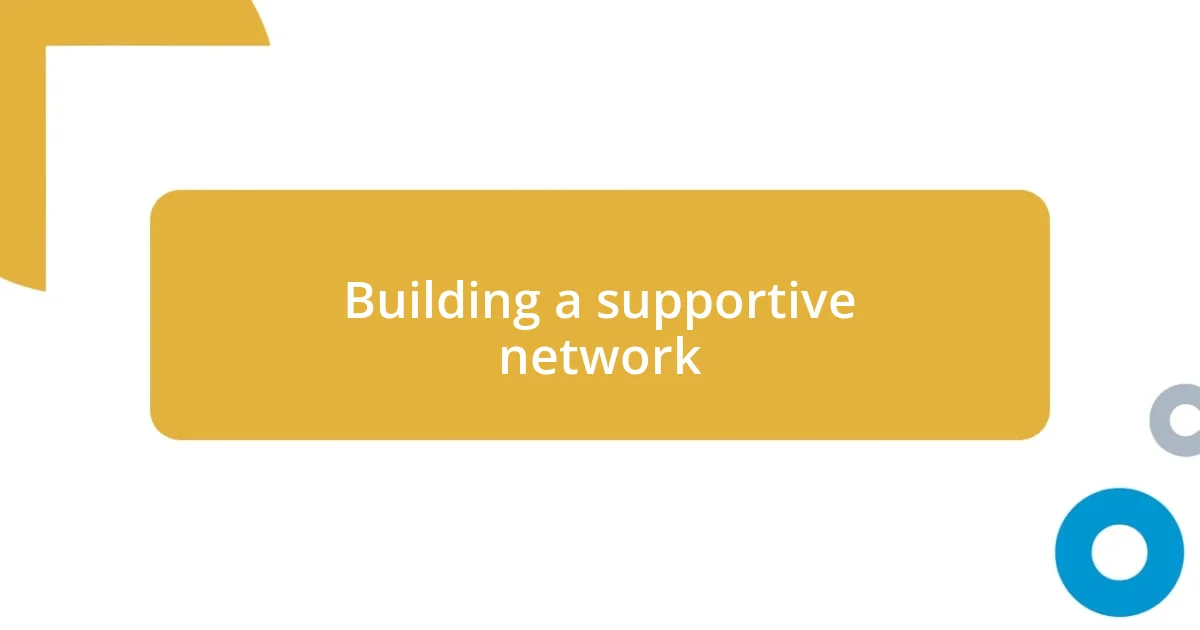
Building a supportive network
Building a supportive network is often a game changer in any professional journey. I learned this the hard way when I found myself working solo on projects that would have greatly benefited from collective brainstorming. It was a little daunting at first, though. I remember joining my first professional group, fumbling through introductions, feeling like I was out of my element. But the warmth of those relationships grew steadily, and I realized that vulnerability in those moments fostered stronger connections.
I can’t stress enough how important it is to seek out mentors. When I finally reached out to someone I admired, expecting little in return, I was surprised by how eager they were to offer guidance. That single conversation opened doors I never anticipated, and I often think, “What if I had not taken that first step?” Mentorship can spark transformative changes in one’s career, so don’t shy away from initiating those conversations—my experience taught me that most people genuinely enjoy helping others grow.
Moreover, nurturing your network takes commitment, much like tending to a garden. I recall attending regular meetups, not just for the information shared but for the friendships forged. Sometimes, a casual chat over coffee led to brainstorming sessions that intensified my creativity. Wouldn’t you agree that those serendipitous moments are often where the magic happens? In my case, I found that remaining engaged with my network not only opened doors but also enriched my professional life in ways I’d never imagined.
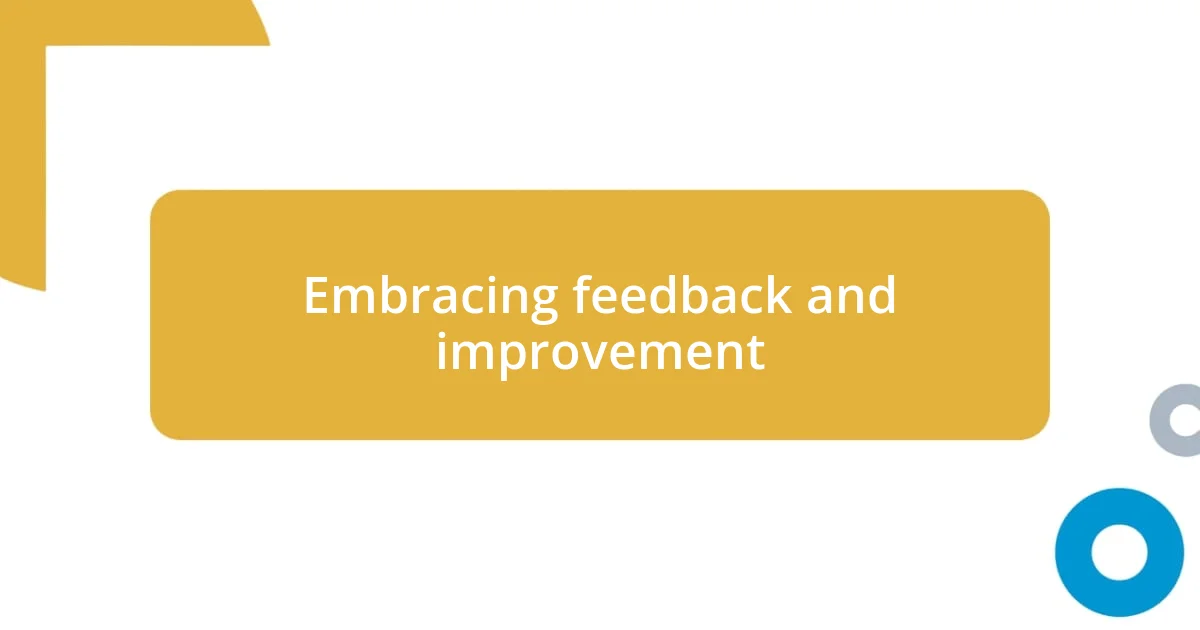
Embracing feedback and improvement
Embracing feedback was a turning point in my professional journey. I remember my first major presentation, feeling confident and ready, only to receive constructive criticism that left me deflated. At first, I struggled with it, but then I realized this feedback was a goldmine for improvement. It taught me that feedback isn’t meant to tear us down; instead, it’s a tool for growth. Have you ever noticed how the most successful people often turn to feedback for guidance?
As I began to actively seek out feedback, I noticed a significant change in my approach. For example, after a project review, I started asking specific questions about areas I could enhance. This made my colleagues feel valued and part of the process. I once asked a peer what they thought about my project’s direction, and their insights helped me pivot in a way I had never considered. This back-and-forth not only enriched my work but also fostered a deeper sense of camaraderie in our team. Don’t you think collaboration fuels creativity?
Improvement requires a mindset shift, and embracing feedback is central to that journey. There was a moment when an unexpected critique from my manager felt discouraging at first. However, reflecting on it later, I understood that it was precisely what I needed to elevate my skills. I began approaching feedback sessions as opportunities rather than obstacles. How could adopting a similar mindset change your experience with feedback? Each time I embraced criticism, I uncovered layers of improvement that transformed not just my work, but my confidence too.
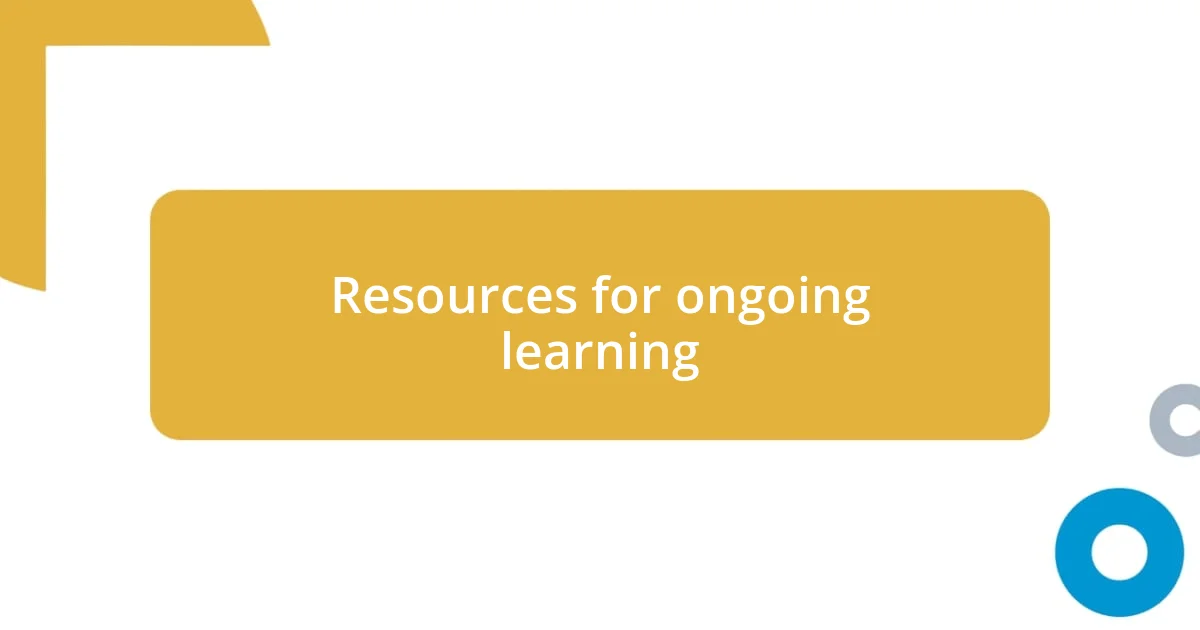
Resources for ongoing learning

Resources for ongoing learning
One of the best resources I stumbled upon for ongoing learning was online courses. I remember signing up for a course in digital marketing, thinking it would simply be a checkbox on my professional development list. Instead, it became a turning point in my career, allowing me to gain practical skills I immediately applied to my projects. Have you ever had a learning experience that sparked excitement in you like that? It’s thrilling to discover how knowledge can directly enhance your work.
Podcasts have also been a game-changer for me. I vividly recall long commutes where I transitioned from mindlessly snacking to soaking up invaluable insights from industry leaders. It felt almost like having a mentor beside me, sharing their journey and strategies. Those stories and strategies have shaped my approach in ways I never anticipated. Is there a podcast that inspires you? If not, I highly recommend exploring this medium for fresh ideas and motivation.
Books are another treasure trove of learning. I remember picking up a classic in my field, and it was like unlocking a door I didn’t know existed. Each page opened up new perspectives and tools that I was eager to implement. Do you have a go-to book that has influenced your thinking? I often find that the lessons I learned from books linger with me long after I’ve closed the cover, serving as a guide in my ongoing journey of professional growth.

